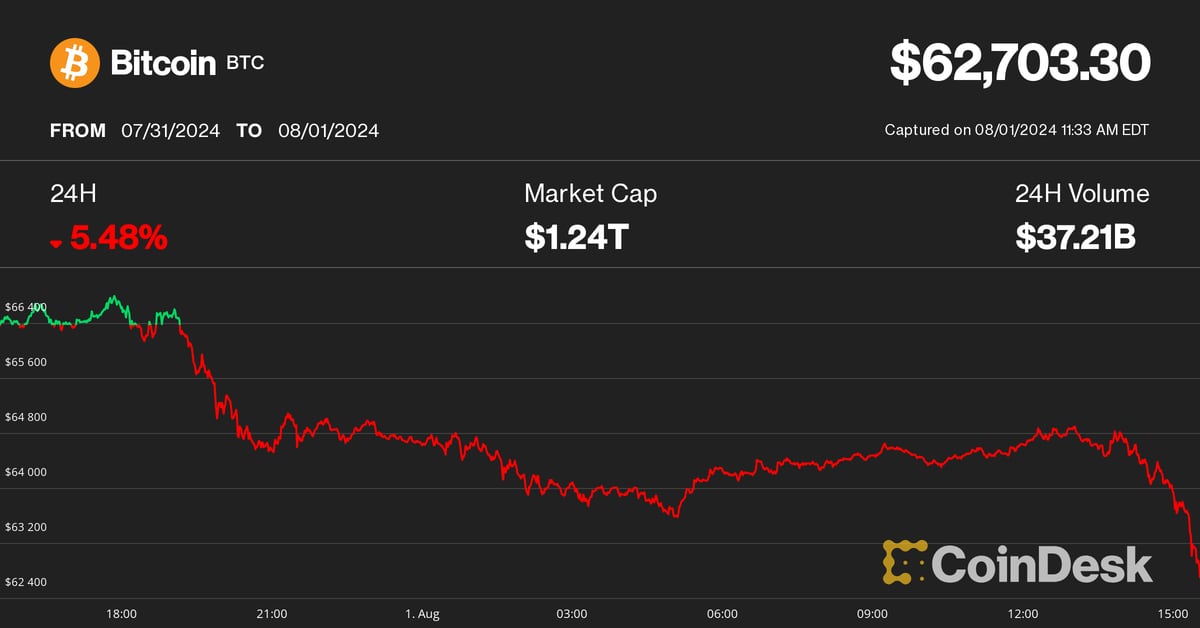Blockchain
How artificial intelligence and blockchain are reshaping currency markets


The financial landscape is undergoing a profound digital transformation, with technological advances reshaping the way currency markets operate.
As outlined in the Argentex FX Navigator Report 2024, staying informed and adapting to these changing market dynamics is critical to navigating the complex and rapidly evolving world of foreign exchange (FX) trading.
Over the past decade, the integration of technologies such as electronic trading platforms, mobile banking and algorithmic trading has revolutionized the financial industry.
Now, the emergence of disruptive innovations such as artificial intelligence (AI) and blockchain is further accelerating the pace of change, creating both opportunities and challenges for currency market participants.
The influence of Blockchain on currency markets
At the heart of blockchain technology is a distributed, decentralized ledger that records transactions in a secure, transparent and tamper-proof manner. This technology could have significant implications for currency markets, particularly in the areas of settlement systems and transaction transparency.
One of the main advantages of blockchain in FX trading is the ability to significantly reduce settlement times and costs. Traditional cross-border payment systems can often be slow and cumbersome, with multiple intermediaries and long processing times.
However, blockchain-based settlement platforms, such as RippleNet, are changing this landscape by enabling near-instantaneous, low-cost transactions.
“Value moving at the speed of data with potentially close to zero cost speaks for itself,” noted one industry expert in a recent survey conducted by Ripple and the Faster Payments Council of the United States.
By eliminating the need for intermediaries and streamlining the settlement process, blockchain-based solutions are poised to transform the efficiency and cost-effectiveness of global currency transfers.
Improve transparency and security
In addition to improvements in regulations, blockchain technology also brings greater transparency and security to currency transactions. The decentralized and immutable nature of the blockchain ledger provides a robust audit trail, allowing for greater visibility and traceability of all FX activity.
This increased transparency can help mitigate the risk of fraudulent activity, strengthen regulatory compliance and promote greater trust within currency markets.
“Blockchain will help by speeding up payments between businesses, reducing settlement windows, and ensuring near real-time payments for all bookings,” noted one survey respondent.
Long-term implications and adoption trends
The increased efficiency, security and transparency offered by blockchain-based solutions is expected to drive wider adoption across the FX ecosystem, from banks and financial institutions to fintech startups and corporate treasury departments.
“For payment system users, observing patterns and perspectives is an important part of keeping pace with an ever-changing landscape,” says the survey report from Ripple and US Faster Payments Council.
The survey results revealed that more than 60% of respondents believe that the use of blockchain technology can deliver significant benefits to their organizations, including improved payment experiences for end consumers and new competitive advantages.
Artificial intelligence in currency trading
In addition to the rise of blockchain, the integration of artificial intelligence (AI) is also transforming currency markets, improving trading strategies, risk management and predictive analytics.
One of the most important applications of artificial intelligence in FX trading is the development of sophisticated trading algorithms that can analyze large amounts of market data, identify patterns and execute trades more quickly and efficiently than human traders.
Major investment banks, such as Barclays and HSBC, are enhancing their traditional trading systems with neural networks to optimize algorithmic trading in real time, leading to better liquidity, tighter bid-ask spreads and reduced transaction costs.
“Algorithmic trading now accounts for more than two-thirds of total FX transactions in the UK,” according to the Argentex FX Navigator Report 2024.
“Complex AI algorithms can analyze market data, identify patterns and execute trades more quickly and efficiently than humans.”
Advanced sentiment analysis and predictive analytics
AI-based sentiment analysis tools are also gaining ground in currency markets, as banks and financial institutions seek to build behavioral models of different market participants.
By leveraging natural language processing on news streams, social media chatter, and other data sources, these AI systems can gauge trader sentiment and emotions, which can have a significant impact on currency fluctuations.
Furthermore, the growing reliance on predictive analytics is transforming FX trading strategies. Deep learning algorithms can absorb years of diverse market data to detect hidden patterns and make probabilistic predictions about future price movements.
Citigroup’s AI forecasting engine, ASSIST, is one such example, analyzing technical indicators, macroeconomic variables and price trends to generate actionable trading signals.
Innovations in intelligent order routing
AI integration is also driving advances in intelligent order routing (SOR) systems, which are gaining popularity among FX brokers.
These AI-powered tools divide larger orders into smaller blocks and identify optimal paths to reduce slippage and minimize market impact, ultimately improving execution quality.
“UK fintechs have developed SOR solutions that incorporate machine learning to adapt routing logic based on past performance data,” the Argentex report notes. “This provides a customized liquidity supply for specific operations.”
Improve efficiency and productivity
The widespread adoption of AI in currency trading is improving efficiency, accuracy and productivity across the FX ecosystem. While human traders still play a crucial role, AI-powered tools are proving indispensable for successful trading in fast-paced currency markets.
“The rapid adoption of AI is improving efficiency, accuracy and productivity in UK FX trading businesses,” the Argentex report states.
“Regulators are also working closely with financial institutions to formulate policies and standards for the safe and ethical use of AI technology in FX trading.”
Challenges and considerations
One of the key concerns surrounding the integration of AI and blockchain into currency trading is the need for a robust regulatory oversight and compliance framework.
Policymakers and financial authorities must work with industry players to develop guidelines and standards that ensure these technologies are used responsibly, transparently and ethically.
“Regulators are also working closely with financial institutions to formulate policies and standards for the safe and ethical use of AI technology in FX trading,” the Argentex report highlights.
Cyber security and data privacy
The growing reliance on digital technologies also raises concerns about cybersecurity and data privacy.
Robust measures must be in place to protect against cyber threats, data breaches and unauthorized access that could compromise the integrity of currency transactions and sensitive financial information.
“Data privacy is important to ensure the security of customer data,” notes one industry expert.
“Avoid cyber threats, breaches, bugs or other unauthorized access that can destroy or vanish data or lead to serious financial scams.”
Beyond regulatory and technical challenges, the integration of artificial intelligence and blockchain into currency markets also raises ethical considerations. Financial professionals must ensure that these technologies are not exploited or used to undermine accountability, transparency or fair market practices.
“Ethical consideration is a significant factor for traders in AI-based forex marketing,” says an industry analysis. “Protects against unauthorized practices, discriminatory trading and market manipulation.”
The future of currency markets
As currency markets continue to evolve, the integration of AI and blockchain technologies is set to have a profound and lasting impact. While navigating the complexities and challenges of these innovations can be daunting, the potential benefits in efficiency, safety and market insight are clear.
“With more real-world data to learn from, these intelligent systems will become even smarter and push the UK to the forefront of harnessing AI innovation to transform global currency trading,” the Argentex report concludes.
By taking stock of the AI and blockchain tools at their disposal, currency market participants can unlock new opportunities, improve their competitive advantage, and position themselves for long-term success in the ever-changing financial landscape.
Was this article helpful?
Yes No
Sign up to receive daily business insights
Blockchain
Bitcoin (BTC) Price Crashes as Donald Trump’s Win Odds Dip

Markets received nominally good news on Thursday morning, with the US ISM manufacturing PMI for July falling much more than economists expected, sending interest rates to multi-month lows across the board. Additionally, initial jobless claims in the US jumped to their highest level in about a year. Taken together, the data adds to the sentiment that the US is on the verge of a cycle of monetary easing by the Federal Reserve, which is typically seen as bullish for risk assets, including bitcoin.
Blockchain
Terra Blockchain Reboots After Reentry Attack Leads to $4M Exploit

Please note that our Privacy Policy, terms of use, cookiesAND do not sell my personal information has been updated.
CoinDesk is a awarded press agency that deals with the cryptocurrency sector. Its journalists respect a rigorous set of editorial policiesIn November 2023, CoinDesk has been acquired from the Bullish group, owner of Bullisha regulated digital asset exchange. Bullish Group is majority owned by Block.one; both companies have interests in a variety of blockchain and digital asset businesses and significant digital asset holdings, including bitcoin. CoinDesk operates as an independent subsidiary with an editorial board to protect journalistic independence. CoinDesk employees, including journalists, are eligible to receive options in the Bullish group as part of their compensation.
Blockchain
$6.8M Stolen, ASTRO Collapses 60%

In the latest news in the blockchain industry, there has been a turn of events that has severely affected Terra and its users and investors, with the company losing $6.8 million. The attack, which exploited a reentry vulnerability in the network’s IBC hooks, raises questions about the security measures of the once celebrated blockchain protocol.
A web3 security company, Cyvers Alerts reported that the exploit occurred on July 31st and caused the company to lose 60 million ASTRO, 3.5 million USDC500,000 USDTand 2. 7 BitcoinThe flaw was discovered in April and allows cybercriminals to make payments non-stop by withdrawing money from the network.
Earth’s response
Subsequently, to the hack employed on the Terra blockchain, its official X platform declared the Suspension network operations for a few hours to apply the emergency measure. Finally in its sendTerra’s official account agreed, sharing that its operations are back online: the core transactions that make up the platform are now possible again.
However, the overall value of the various assets lost in the event was unclear.
Market Impact: ASTRO Crashes!
The hack had an immediate impact on the price of ASTRO, which dropped nearly 60% to $0.0206 following the network shutdown. This sharp decline highlights the vulnerability of token prices to security breaches and the resulting market volatility.
This incident is not the first time Terra has faced serious challenges. Earlier this year, the blockchain encountered significant problems that called into question its long-term viability. These repeated incidents underscore the need for stronger security measures to protect users’ assets and maintain trust in the network.
The recent Terra hack serves as a stark reminder of the ongoing security challenges in the blockchain space. As the platform works to regain stability, the broader crypto community will be watching closely.
Read also: Record Cryptocurrency Theft: Over $1 Billion Stolen in 2024
This is a major setback for Terra. How do you think this will impact the blockchain industry?
Blockchain
Luxembourg proposes updates to blockchain laws | Insights and resources

On July 24, 2024, the Ministry of Finance proposed Blockchain Bill IVwhich will provide greater flexibility and legal certainty for issuers using Distributed Ledger Technology (DLT). The bill will update three of Luxembourg’s financial laws, the Law of 6 April 2013 on dematerialised securitiesTHE Law of 5 April 1993 on the financial sector and the Law of 23 December 1998 establishing a financial sector supervisory commissionThis bill includes the additional option of a supervisory agent role and the inclusion of equity securities in dematerialized form.
DLT and Luxembourg
DLT is increasingly used in the financial and fund management sector in Luxembourg, offering numerous benefits and transforming various aspects of the industry.
Here are some examples:
- Digital Bonds: Luxembourg has seen multiple digital bond issuances via DLT. For example, the European Investment Bank has issued bonds that are registered, transferred and stored via DLT processes. These bonds are governed by Luxembourg law and registered on proprietary DLT platforms.
- Fund Administration: DLT can streamline fund administration processes, offering new opportunities and efficiencies for intermediaries, and can do the following:
- Automate capital calls and distributions using smart contracts,
- Simplify audits and ensure reporting accuracy through transparent and immutable transaction records.
- Warranty Management: Luxembourg-based DLT platforms allow clients to swap ownership of baskets of securities between different collateral pools at precise times.
- Tokenization: DLT is used to tokenize various assets, including real estate and luxury goods, by representing them in a tokenized and fractionalized format on the blockchain. This process can improve the liquidity and accessibility of traditionally illiquid assets.
- Tokenization of investment funds: DLT is being explored for the tokenization of investment funds, which can streamline the supply chain, reduce costs, and enable faster transactions. DLT can automate various elements of the supply chain, reducing the need for reconciliations between entities such as custodians, administrators, and investment managers.
- Issuance, settlement and payment platforms:Market participants are developing trusted networks using DLT technology to serve as a single source of shared truth among participants in financial instrument investment ecosystems.
- Legal framework: Luxembourg has adapted its legal framework to accommodate DLT, recognising the validity and enforceability of DLT-based financial instruments. This includes the following:
- Allow the use of DLT for the issuance of dematerialized securities,
- Recognize DLT for the circulation of securities,
- Enabling financial collateral arrangements on DLT financial instruments.
- Regulatory compliance: DLT can improve transparency in fund share ownership and regulatory compliance, providing fund managers with new opportunities for liquidity management and operational efficiency.
- Financial inclusion: By leveraging DLT, Luxembourg aims to promote greater financial inclusion and participation, potentially creating a more diverse and resilient financial system.
- Governance and ethics:The implementation of DLT can promote higher standards of governance and ethics, contributing to a more sustainable and responsible financial sector.
Luxembourg’s approach to DLT in finance and fund management is characterised by a principle of technology neutrality, recognising that innovative processes and technologies can contribute to improving financial services. This is exemplified by its commitment to creating a compatible legal and regulatory framework.
Short story
Luxembourg has already enacted three major blockchain-related laws, often referred to as Blockchain I, II and III.
Blockchain Law I (2019): This law, passed on March 1, 2019, was one of the first in the EU to recognize blockchain as equivalent to traditional transactions. It allowed the use of DLT for account registration, transfer, and materialization of securities.
Blockchain Law II (2021): Enacted on 22 January 2021, this law strengthened the Luxembourg legal framework on dematerialised securities. It recognised the possibility of using secure electronic registration mechanisms to issue such securities and expanded access for all credit institutions and investment firms.
Blockchain Act III (2023): Also known as Bill 8055, this is the most recent law in the blockchain field and was passed on March 14, 2023. This law has integrated the Luxembourg DLT framework in the following way:
- Update of the Act of 5 August 2005 on provisions relating to financial collateral to enable the use of electronic DLT as collateral on financial instruments registered in securities accounts,
- Implementation of EU Regulation 2022/858 on a pilot scheme for DLT-based market infrastructures (DLT Pilot Regulation),
- Redefining the notion of financial instruments in Law of 5 April 1993 on the financial sector and the Law of 30 May 2018 on financial instruments markets to align with the corresponding European regulations, including MiFID.
The Blockchain III Act strengthened the collateral rules for digital assets and aimed to increase legal certainty by allowing securities accounts on DLT to be pledged, while maintaining the efficient system of the 2005 Act on Financial Collateral Arrangements.
With the Blockchain IV bill, Luxembourg will build on the foundations laid by previous Blockchain laws and aims to consolidate Luxembourg’s position as a leading hub for financial innovation in Europe.
Blockchain Bill IV
The key provisions of the Blockchain IV bill include the following:
- Expanded scope: The bill expands the Luxembourg DLT legal framework to include equity securities in addition to debt securities. This expansion will allow the fund industry and transfer agents to use DLT to manage registers of shares and units, as well as to process fund shares.
- New role of the control agent: The bill introduces the role of a control agent as an alternative to the central account custodian for the issuance of dematerialised securities via DLT. This control agent can be an EU investment firm or a credit institution chosen by the issuer. This new role does not replace the current central account custodian, but, like all other roles, it must be notified to the Commission de Surveillance du Secteur Financier (CSSF), which is designated as the competent supervisory authority. The notification must be submitted two months after the control agent starts its activities.
- Responsibilities of the control agent: The control agent will manage the securities issuance account, verify the consistency between the securities issued and those registered on the DLT network, and supervise the chain of custody of the securities at the account holder and investor level.
- Simplified payment processesThe bill allows issuers to meet payment obligations under securities (such as interest, dividends or repayments) as soon as they have paid the relevant amounts to the paying agent, settlement agent or central account custodian.
- Simplified issuance and reconciliationThe bill simplifies the process of issuing, holding and reconciling dematerialized securities through DLT, eliminating the need for a central custodian to have a second level of custody and allowing securities to be credited directly to the accounts of investors or their delegates.
- Smart Contract Integration:The new processes can be executed using smart contracts with the assistance of the control agent, potentially increasing efficiency and reducing intermediation.
These changes are expected to bring several benefits to the Luxembourg financial sector, including:
- Fund Operations: Greater efficiency and reduced costs by leveraging DLT for the issuance and transfer of fund shares.
- Financial transactions: Greater transparency and security.
- Transparency of the regulatory environment: Increased attractiveness and competitiveness of the Luxembourg financial centre through greater legal clarity and flexibility for issuers and investors using DLT.
- Smart Contracts: Potential for automation of contractual terms, reduction of intermediaries and improvement of transaction traceability through smart contracts.
Blockchain Bill IV is part of Luxembourg’s ongoing strategy to develop a strong digital ecosystem as part of its economy and maintain its status as a leading hub for financial innovation. Luxembourg is positioning itself at the forefront of Europe’s growing digital financial landscape by constantly updating its regulatory framework.
Local regulations, such as Luxembourg law, complement European regulations by providing a more specific legal framework, adapted to local specificities. These local laws, together with European initiatives, aim to improve both the use and the security of projects involving new technologies. They help establish clear standards and promote consumer trust, while promoting innovation and ensuring better protection against potential risks associated with these emerging technologies. Check out our latest posts on these topics and, for more information on this law, blockchain technology and the tokenization mechanism, do not hesitate to contact us.
We are available to discuss any project related to digital finance, cryptocurrencies and disruptive technologies.
This informational piece, which may be considered advertising under the ethics rules of some jurisdictions, is provided with the understanding that it does not constitute the rendering of legal or other professional advice by Goodwin or its attorneys. Past results do not guarantee a similar outcome.
-

 Regulation12 months ago
Regulation12 months agoRipple CTO and Cardano founder clash over XRP’s regulatory challenges ⋆ ZyCrypto
-

 Regulation10 months ago
Regulation10 months agoNancy Pelosi Considers Supporting Republican Crypto Bill FIT21 – London Business News
-

 Videos11 months ago
Videos11 months agoCryptocurrency News: Bitcoin, ETH ETF, AI Crypto Rally, AKT, TON & MORE!!
-

 Regulation11 months ago
Regulation11 months agoBitcoin’s future is ‘bleak’ and ripe for regulation, says lead developer
-

 News8 months ago
News8 months agoAave Price Increases Following Whales Accumulation and V3.1 Launch
-

 Regulation8 months ago
Regulation8 months agoSouth Korea Imposes New ‘Monitoring’ Fees on Cryptocurrency Exchanges
-

 Regulation8 months ago
Regulation8 months agoA Blank Sheet for Cryptocurrencies: Kamala Harris’ Regulatory Opportunity
-

 Regulation8 months ago
Regulation8 months agoCryptocurrency Regulations in Slovenia 2024
-

 News11 months ago
News11 months agoThe trader earned $46 million with PEPE after reaching a new ATH
-

 Regulation11 months ago
Regulation11 months agoCrypto needs regulation to thrive: Tyler Cowen
-

 Blockchain11 months ago
Blockchain11 months agoSolana ranks the fastest blockchain in the world, surpassing Ethereum, Polygon ⋆ ZyCrypto
-

 Blockchain11 months ago
Blockchain11 months agoSolana Surpasses Ethereum and Polygon as the Fastest Blockchain ⋆ ZyCrypto





